Bush Winks at Iran
With Moqtada al-Sadr walking out of Nouri al-Maliki's government, the Iraqi prime minister is desperate for the support of prominent Shiite Abdul Aziz al-Hakim and his 30 parliamentarians, which may explain President Bush's meeting with the politician earlier Monday. However, Hakim has strong ties to Iran, which is widely assumed to equip and fund his militia, placing Bush in yet another awkward tap dance between stability in Iraq and hostility toward Iran.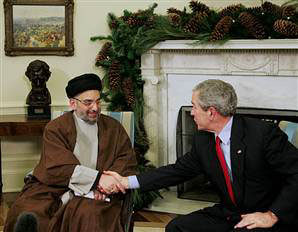
With Moqtada al-Sadr walking out of Nouri al-Maliki’s government, the Iraqi prime minister is desperate for the support of prominent Shiite Abdul Aziz al-Hakim and his 30 parliamentarians, which may explain President Bush’s meeting with the politician earlier Monday. However, Hakim has strong ties to Iran, which is widely assumed to equip and fund his militia, placing Bush in yet another awkward tap dance between stability in Iraq and hostility toward Iran.
Your support matters…Newsweek:
On the surface, the message seems clear enough. As leader of one of the most powerful blocs in Iraq’s parliament, Hakim is one of the few Iraqi politicians positioned to rescue the foundering government of Iraqi Prime Minister Nouri al-Maliki. As sectarian violence has exploded over the past several weeks, Maliki’s hold on power appears more tenuous than ever. Even some of Bush’s closest aides, like National Security Adviser Stephen J. Hadley, have questioned whether Maliki is up to the job. And the problem was only compounded last week when followers of radical Shiite cleric Moqtada al-Sadr announced they would boycott Maliki’s government. The Sadrist threats probably aren’t enough to topple Maliki’s government on their own. Still, securing the support of Hakim’s bloc of 30 parliamentarians — the same number as those who support Sadr’s party — seems more urgent than ever for Maliki and his allies in Washington.
Yet at least some Iraqis say they are also getting another signal. The final report of the Iraq Study Group, due to be delivered on Wednesday, is expected to call for talks with Iraq’s neighbors, including Iran. And Hakim could end up emerging as a key conduit, acting as a “mediator” between the United States and the Islamic republic, according a senior Iraqi government official, who didn’t want to be identified discussing sensitive diplomacy. The Iranians “send a very clear message through Hakim,” says the Iraqi official. “They want to be recognized and reckoned with.”
It wouldn’t be the first time that the Bush administration has turned to Hakim for help. In one sense, American policymakers considered the Hakim family natural allies during the original push to overthrow Saddam Hussein. As a son of the Grand Ayatollah Muhsin al-Hakim, Abdul-Aziz was born into one of Shia Islam’s most prominent families. In 1982, he helped to found the Supreme Council for the Islamic Revolution in Iraq (SCIRI) — one of the key groups working to overthrow the Iraqi dictator. When Hakim’s brother Baqir was assassinated in Najaf in 2003, Abdul-Aziz took over the group’s leadership, and was eventually appointed president of the U.S.-backed Iraqi Governing Council in 2003.
But Hakim’s ties to Iran’s clerical leadership — along with his command of SCIRI’s Badr Corps militia, which fought against Iraq in the Iran-Iraq war during the 1980s — also made him a dangerous figure in the eyes of at least some Americans. At a press conference back in March 2003, Defense Secretary Donald Rumsfeld dismissed Hakim’s Badr fighters as “unhelpful,” and declared that the militiamen be “treated as combatants.” “The Badr Corps is trained, equipped and directed by Iran’s Islamic Revolutionary Guard,” Rumsfeld insisted. “We will hold the Iranian government responsible for their actions.” Even Sadr regularly rails against the dangers of Iranian influence in Iraq, warning that the country’s intelligence operatives are trying to infiltrate his organization. In recent months, Hakim’s Badr forces have periodically clashed with Sadr’s Mahdi Army, fueling tensions even further. Some worry that a fight between Sadr and Badr could be just as bloody as the current Sunni-Shia violence.
Independent journalism is under threat and overshadowed by heavily funded mainstream media.
You can help level the playing field. Become a member.
Your tax-deductible contribution keeps us digging beneath the headlines to give you thought-provoking, investigative reporting and analysis that unearths what's really happening- without compromise.
Give today to support our courageous, independent journalists.


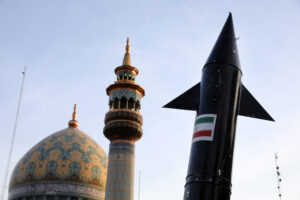
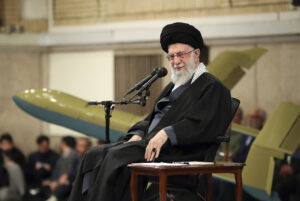

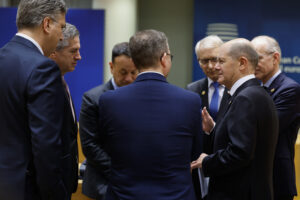
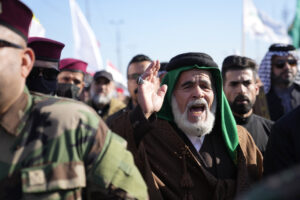


You need to be a supporter to comment.
There are currently no responses to this article.
Be the first to respond.